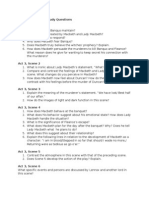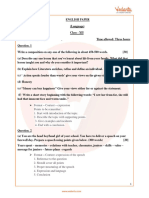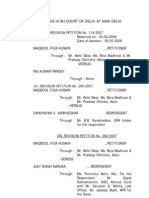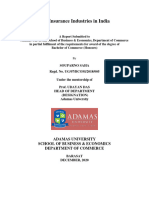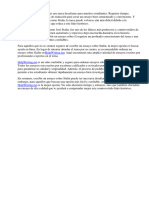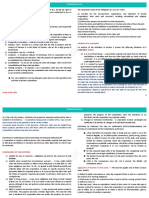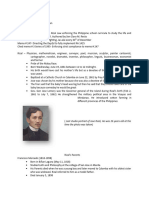ENGLISH LITERATURE PROJECT
2024-2025
NAME: RUCHIKA JAISWAL
CLASS AND SECTION : 12 - C
Page 1 of 14
� Sl. No Particulars Page No.
A. INTRODUCTION 6
1. The Witches’ Prophecies: The Seed of Ambition 7
2. 2.Impact of the Prophecies on Macbeth 8
3. 3.The Floating Dagger: The Path to Regicide
4. 4. Psychological Impact on Macbeth
5. 5. Banquo’s Ghost: The Manifestation of Guilt
6. 6.Macbeth’s Reaction and Subsequent Actions
7. 7.The Witches’ Apparitions: The Illusion of
8. 8. Macbeth’s Interpretation and Actions
9. 9.Lady Macbeth’s Madness: The Final Consequence
10. 10.Impact on Macbeth and His Downfall
B. CONCLUSION
Page 2 of 14
� JSS INTERNATIONAL SCHOOL
CIRTIFICATE
This is to certify that Ms. Ruchika Jaiswal has satisfactorily completed the
project in English literature prescribed by the ISC BOARD- Grade XII of this
institution in the year 2024- 2025
Signature of Teacher in - charge
Name of the Candidate: Ruchika Jaiswal
Date:
Page 3 of 14
� JSS INTERNATIONAL SCHOOL
ACKNOWLEDGEMENT
I would like to express my sincere gratitude to my teacher Ms. Gayathri Saravanan as well as my
Principal Ms. Lata Nakra for their advice and encouragement in planning and executing this project.
This also helped me research and gain a lot of knowledge. Secondly, I would also like to thank my
parents and friends who helped me in finalizing this project within the limited time frame.
Name of the Candidate: Ruchika Jaiswal
Class/Section: 12 'C'
Date:
Page 4 of 14
� RESEARCH QUESTION
Supernatural events occur throughout the play Macbeth. Each time Macbeth encounters something
supernatural-the witches, the floating dagger, a ghost-he moves more deeply into evil. Discuss the
supernatural events and comment on how each marks a step in Macbeth's downfall.
Page 5 of 14
�A . Introduction
According to the Oxford Advanced Learner dictionary, `supernatural' refers to
things that cannot be explained by natural or physical laws. The presence of
supernatural forces in "Macbeth," provides for much of the play's dramatic
tension and the mounting suspense. In this paper we shall look at some of
supernatural elements in the play.
Macbeth by William Shakespeare is a profound exploration of ambition, guilt, and
the supernatural. The play is rife with supernatural elements that significantly
influence the characters, especially Macbeth. Each supernatural encounter marks
a step deeper into his moral corruption and eventual downfall. This essay delves
into these supernatural events—the witches' prophecies, the floating dagger,
Banquo's ghost, and the witches' apparitions—and analyzes their impact on
Macbeth's journey towards evil.
Page 6 of 14
�1.The Witches’ Prophecies: The Seed of Ambition
(i) First Encounter with the Witches (Act 1, Scene 3)
The play begins with Macbeth and Banquo encountering the witches on a
desolate heath. The witches greet Macbeth with titles that will lead to his
ultimate ruin: Thane of Glamis, Thane of Cawdor, and "king hereafter." These
prophecies immediately ignite Macbeth's latent ambition. Banquo, curious yet
skeptical, questions their reality, while Macbeth is visibly shaken and intrigued by
the possibility of kingship.
Page 7 of 14
�The witches' prophecies plant the seeds of ambition in Macbeth's mind. Initially,
he is hesitant and conflicted about the implications of these supernatural
revelations. However, the news that he has been made Thane of Cawdor, as
foretold, solidifies his belief in the witches' words and fuels his desire for the
throne. This first encounter with the supernatural propels Macbeth onto a path of
ambition and sets the stage for his subsequent moral descent.
2.Impact of the Prophecies on Macbeth
The witches' prophecies profoundly impact Macbeth's psyche and actions. He
becomes obsessed with the idea of becoming king, leading him to contemplate
regicide. This obsession is evident when he writes to Lady Macbeth, revealing his
ambitions and the supernatural encounter. Her reaction further exacerbates his
ambition as she pushes him towards seizing the throne by any means necessary.
The prophecies catalyze Macbeth's journey into evil by making him aware of his
potential power. His ambition, initially dormant, becomes insatiable, and he starts
considering immoral actions to achieve his goals. This encounter with the witches
marks the beginning of Macbeth's transformation from a loyal soldier to a power-
hungry tyrant.
Page 8 of 14
�3.The Floating Dagger: The Path to Regicide
(i) Description of the Supernatural Vision (Act 2, Scene 1)
As Macbeth contemplates the murder of King Duncan, he experiences a vision of
a floating dagger leading him to Duncan's chamber. This hallucination is a crucial
supernatural event that symbolizes his inner conflict and burgeoning resolve to
commit the heinous act. The dagger, pointing towards Duncan’s room, becomes a
manifestation of Macbeth’s murderous intent and his descent into darkness.
The soliloquy in which Macbeth addresses the dagger reveals his tormented state
of mind. He questions whether the dagger is real or a "false creation, proceeding
from the heat-oppressed brain." This vision blurs the line between reality and
hallucination, emphasizing the overpowering influence of his ambition and guilt.
4. Psychological Impact on Macbeth
The floating dagger has a profound psychological impact on Macbeth. It
represents his inner turmoil and the supernatural’s push towards fulfilling the
Page 9 of 14
�witches' prophecies. This vision solidifies his resolve to kill Duncan, marking a
significant step in his moral decline. The hallucination emboldens him,
transforming his hesitation into determination.
After following the vision to Duncan's chamber, Macbeth emerges as a changed
man. The act of murder fundamentally alters his character, making him more
susceptible to further evil deeds. The supernatural dagger thus symbolizes his
irrevocable commitment to the path of corruption and sets the stage for his
subsequent tyranny.
5. Banquo’s Ghost: The Manifestation of Guilt
(i) The Banquet Scene (Act 3, Scene 4)
During a royal banquet, Macbeth is haunted by the ghost of Banquo, whom he
had ordered to be killed to prevent the witches' prophecy about Banquo's
descendants from coming true. The appearance of Banquo’s ghost at the banquet
table is a pivotal supernatural event that highlights Macbeth’s deepening guilt
and paranoia.
The ghost, visible only to Macbeth, represents his inability to escape the
consequences of his actions. His reaction to the apparition—visible terror and
incoherent speech—alarms his guests and reveals his deteriorating mental state.
Lady Macbeth attempts to dismiss his behavior as a momentary fit, but the
damage is done, and Macbeth’s sanity is called into question.
6.Macbeth’s Reaction and Subsequent Actions
Banquo's ghost forces Macbeth to confront the reality of his crimes. His public
display of fear and guilt erodes his authority and heightens his paranoia. This
supernatural encounter pushes him further into tyranny and violence as he seeks
to secure his power and eliminate perceived threats.
In response to the ghost, Macbeth becomes increasingly ruthless. He decides to
visit the witches again to seek more prophecies, indicating his growing
dependence on the supernatural to guide his actions. Banquo's ghost, thus, marks
a crucial step in Macbeth's downfall by exacerbating his guilt and driving him
towards more extreme measures to maintain his power.
Page 10 of 14
�7.The Witches’ Apparitions: The Illusion of Invincibility
(i) Macbeth’s Second Visit to the Witches (Act 4, Scene 1)
Driven by paranoia and a desire for security, Macbeth returns to the
witches, demanding to know more about his future. They conjure three
apparitions: an armed head, a bloody child, and a crowned child
holding a tree. Each apparition delivers cryptic messages that further
entrench Macbeth in his delusions of invincibility.
The first apparition warns him to beware of Macduff. The second
assures him that no one born of a woman will harm him. The third
predicts that he will remain unvanquished until Birnam Wood comes to
Dunsinane Hill. These prophecies, while seemingly reassuring, are
designed to mislead Macbeth and fuel his overconfidence.
8. Macbeth’s Interpretation and Actions
Macbeth interprets the witches' apparitions as a guarantee of his invincibility. His
misinterpretation leads him to believe that he is untouchable, driving him to
commit even more heinous acts without fear of repercussions. This newfound
confidence results in the brutal murder of Macduff’s family, a senseless act of
violence that further alienates him from his subjects.
The apparitions' prophecies, while superficially reassuring, ultimately contribute
to Macbeth's downfall by instilling a false sense of security. His overconfidence
blinds him to the true meanings of the prophecies and the consequences of his
actions. This encounter with the supernatural marks a critical step in his descent,
as it reinforces his tyrannical behavior and hastens his inevitable defeat.
9.Lady Macbeth’s Madness: The Final Consequence
(i) The Sleepwalking Scene (Act 5, Scene 1)
Lady Macbeth, once the driving force behind Macbeth’s ascent to power,
succumbs to the weight of her guilt. In a poignant sleepwalking scene, she is
observed by a doctor and a gentlewoman as she relives the murders and tries to
Page 11 of 14
�wash the imaginary blood from her hands. This scene underscores the destructive
power of guilt and the supernatural’s role in her downfall.
Her hallucinations and obsessive hand-washing symbolize the inescapable nature
of their crimes. The supernatural elements of her madness—seeing bloodstains
that aren’t there—highlight the psychological toll of their actions. Lady Macbeth’s
deterioration contrasts sharply with her earlier ruthless ambition, demonstrating
the ultimate cost of their pursuit of power.
10.Impact on Macbeth and His Downfall
Lady Macbeth’s descent into madness and subsequent death profoundly affect
Macbeth. Her condition is a stark reminder of the consequences of their ambition
and the supernatural influences that have driven them. Macbeth’s reaction to her
death is one of numb resignation, indicating his complete moral and emotional
disintegration.
In the final act, Macbeth faces his enemies with a fatalistic acceptance of his
doom. The prophecies' true meanings are revealed as Birnam Wood advances on
Dunsinane and Macduff, not naturally born of a woman, confronts him.
Macbeth's overreliance on the supernatural prophecies leads to his undoing. His
tragic end is a culmination of the supernatural events that marked each step of
his downfall.
Page 12 of 14
�B. Conclusion
The supernatural elements in Macbeth—the witches' prophecies, the floating
dagger, Banquo's ghost, and the witches' apparitions—are pivotal in driving the
plot and shaping Macbeth’s character arc. Each encounter with the supernatural
deepens his descent into evil, highlighting the interplay between ambition, guilt,
and fate. These supernatural events not only mark critical steps in Macbeth's
downfall but also underscore the tragic consequences of unchecked ambition
and moral corruption.
Page 13 of 14
�BIBLOGRAPHY
Page 14 of 14











